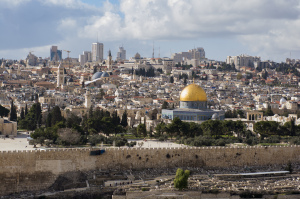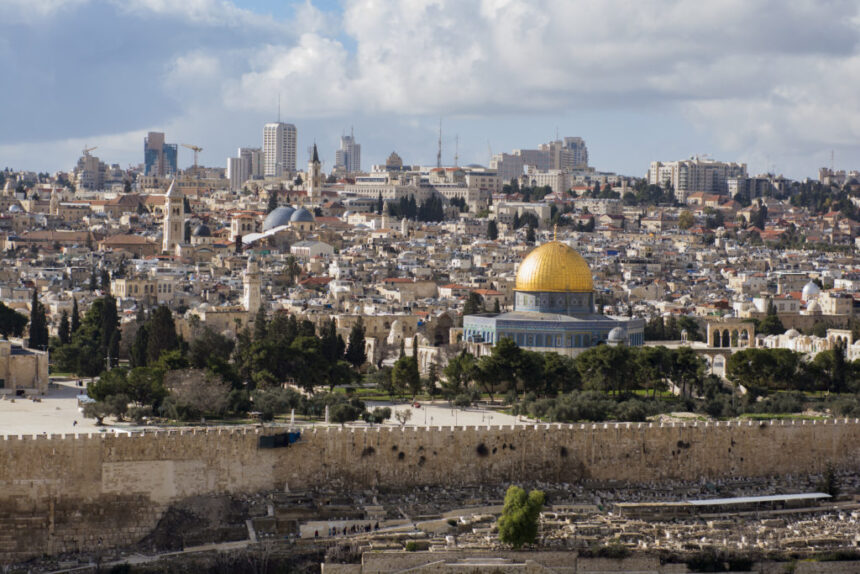
Anders Kiledal | Collegian
The Old City of Jerusalem, with the Dome of the Rock and Eastern Wall in the foreground, as seen from the Mount of Olives.
Earlier this month, 85 Hillsdale College students and faculty members returned from Israel with their political views challenged, their expectations exceeded, and their faiths renewed.
The Philos Project and the Museum of the Bible organized the Israel trip that took place from Jan. 2-13 to give Christian college students the opportunity to learn about the modern state of Israel and strengthen their faith. The organizers said they hope students’ experiences will prompt them to advocate for the truth about Israel and be ambassadors for Jewish-Christian relations.
In their itinerary, the sponsors emphasized Christian and Jewish sites, tours of cities and borders, and lectures, exposing students to multiple political perspectives. The complex political situation the itinerary reflected surprised students like senior Matalyn Vander Bleek, who expected a pro-Israel bias.
“I was prepared to be filtering everything heavily, but then it turned out to be not necessary,” Vander Bleek said. “I think it was fairly presented, and everyone who spoke said their own story, their own point of view. Sometimes that didn’t match up, but that just gave us a better and more true view of the situation.”
Students met with a variety of speakers: Jewish and Palestinian journalists, a Jewish peace negotiator, an Aramaic Christian, members of the Israel Defense Force, a political science professor, and religious leaders.
“I thought often when I was sitting there listening to people that if I had heard the same thing from a third party observer, some American making some statement about Israel, I would highly doubt what they were saying to me,” senior Marie Wathen said. “Everything has its own bias, but it was very clear that their biases were ‘I live this as my reality.’”
Others said they expected the trip would emphasize the religious significance of Israel. Its modern cities paradoxically coexist and conflict with preserved ruins and redefine what a modern Christian pilgrimage looks like.
“I was expecting to have a really emotional experience trying to put myself back in the past and picture everything as it was,” junior Katie Kortepeter said. “After Nazareth, I decided I shouldn’t try to create an experience like that; I should take it for what it is, the modern and the historic. It helped my perspective a lot because I was able to come up with a love for Israel that Jesus probably had.”
Senior Hannah Wolff said she expected Nazareth to be a preserved site, but what she encountered was “not the prettiest” modern city.
“I was reading my Bible, and someone was talking about Jesus, and someone said ‘Can anything good come from Nazareth?’ and I was struck with this fact that Jesus would have come from somewhere like that…To see a modern interpretation come out of that verse was really fascinating.”
While some sites were poignant, others felt fake, students said.
“I felt like a lot of the Christian sites were touristy, and I wasn’t expecting that,” Kortepeter said. “There were people everywhere, gift shops; it was very commercialized.”
Despite the kitsch souvenirs, the sites still boasted 2,000 years of pilgrimage, a history that junior Sarah Reinsel said had “the biggest spiritual impact”
because “so many people had also come here.”
Israel animated students’ knowledge of both religious history and modern politics, revealing real people who live in places most Americans know only through the media.
“It turned the cold, sterile article that you read online into something you can actually touch. You could see the grief on the mothers’ faces; you can see Gaza; you can see the fence; you can see al-Qaida driving around in Syria,” sophomore Nathan Lehman said.
Sophomore Nathaniel Trainor said the opportunity to visit Kibbutz Kfar Aza — a close-knit, agricultural, communal settlement three miles from the Gaza Strip — and speak with a woman who lived there surprised him. As she spoke about her life, she demonstrated the resilience of Israelis, Trainor said.
“These people live with these events every day, and yet they are still able to carry on with their daily lives,” Trainor said.
On the returning El-Al Israel airline flight to John F. Kennedy International Airport, students talked, reflected, and slept. The Philos Project gave Hillsdale students multiple perspectives and challenged them to research and maintain the conversation back home.
Despite being back in Hillsdale, senior Naomi Virnelson summed up the feeling of having just begun her Israel journey.
“I was hoping for a lot more answers,” she said, “but now I have a lot more questions.”

